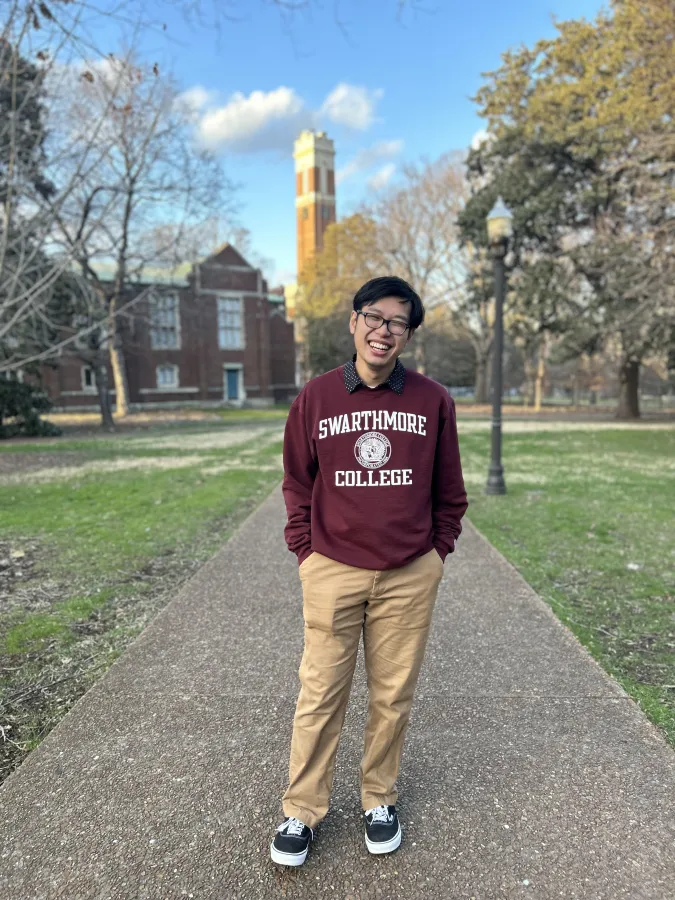Erich Trinh '24

“Everyone brings their own meaning to music,” says Eric Trinh ‘24. As a composer, he encourages performers to interpret his music their own way: “I'm intentional with the meaning that I'm trying to convey, but if someone wants to interpret it a separate way, I can't stop that.”
Trinh started with piano and chorus in elementary school and has been singing ever since. He remained in chorus through high school and joined musical theater. At Swarthmore, Trinh is a political science major and music minor. Outside of music his “interest throughout life has been voting and American politics.” This has served as the topic of his senior comprehensive, which is on the voting patterns of Asian Americans in rural areas.
“Choruses were really important for me [in college] to find community and friends freshman year and beyond,” says Trinh. Half of his music experience at Swarthmore has been with groups such as Chorus, Garnet Singers, and the Offbeat acapella group. The other half has been dedicated to voice lessons. After eight semesters with Lara Nie, he’s grateful for her mentorship, saying, “She’s helped me find my voice and also helped me explore who I am as a person.”
Another important mentor in Trinh’s Swarthmore journey is the former chorus director, Joseph Gregorio. “[Gregorio] gave me the confidence that I can compose, and the opportunity to get to know a lot of people and sing for hours on a Wednesday night,” Trinh says. In his sophomore spring, Gregorio encouraged Trinh to write his first composition, a piece based on a Dorothy Parker poem, for the chorus in the spring of his sophomore year.
After graduation, Trinh plans on becoming a social studies teacher. Although that seems to have little in common with singing, he says his music department mentors have had an important role in shaping his career. His political science major has prepared him for the academic side of the job, while his music minor has introduced him to teaching styles he might one day use in his own classroom. “Being in the music department and around music, I’ve been exposed to a lot of different teaching styles from directors, conductors, and voice teachers,” he explains. He hopes to translate these teaching methods across disciplines. “It’s been helpful to me,” he says, “thinking about how different teaching styles work in a musical setting and how that can apply to being a social studies teacher.”
Trinh says, “[Music] is a way of expressing yourself, and of seeing how other people express themselves, which is especially true for a choral setting.” He keeps this in mind when he sings and composes — talents which will feature in Trinh’s senior recital. Trinh will sing pieces by Mozart and Copland, and two of his original compositions will be performed by a group of Swarthmore students. One of the compositions, “The Story of Mrs. W,” is the piece he wrote for chorus sophomore year. The second, “O Loving Father,” is based on a poem his high school math teacher wrote and gave to him as a parting gift. Trinh composed this piece as a last hurrah for his school, which is closing down this year. In celebration of Trinh’s time here at Swarthmore, his recital will be held open to the public on Saturday, April 20th, from 8-9 pm in the Lang Concert Hall.
-
Favorite music making experience at Swarthmore: Being able to hear my pieces for the first time.
What you'll miss most about Swat: The people.
Sound or noise you love: I can only think of a joke answer: The last note of Santa Fe, specifically from Jeremy Jordan.
Sound or noise you hate: Perfect fourths in a classical context.
Last song you played on your phone: Bryn Terfel’s “Deh vieni alla finestra.”



